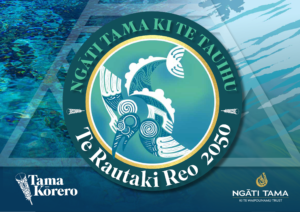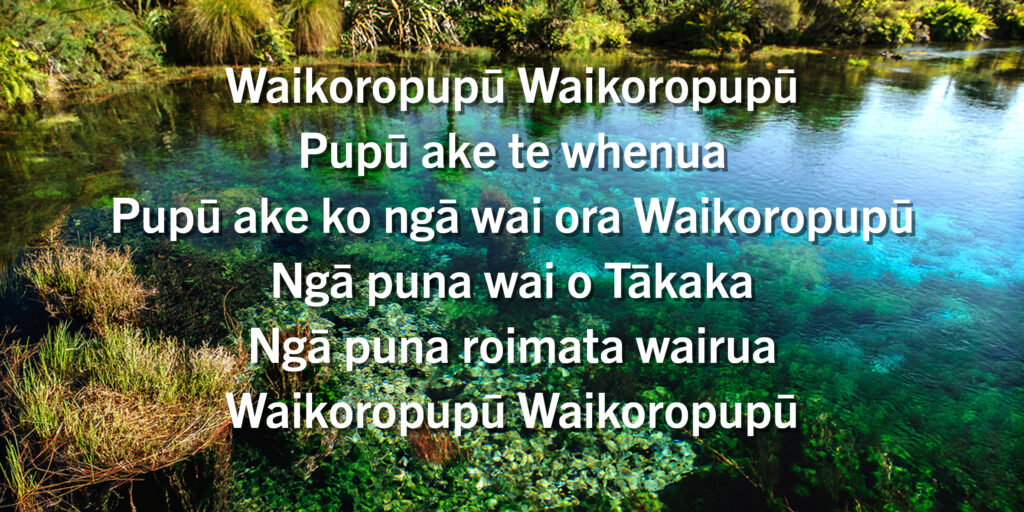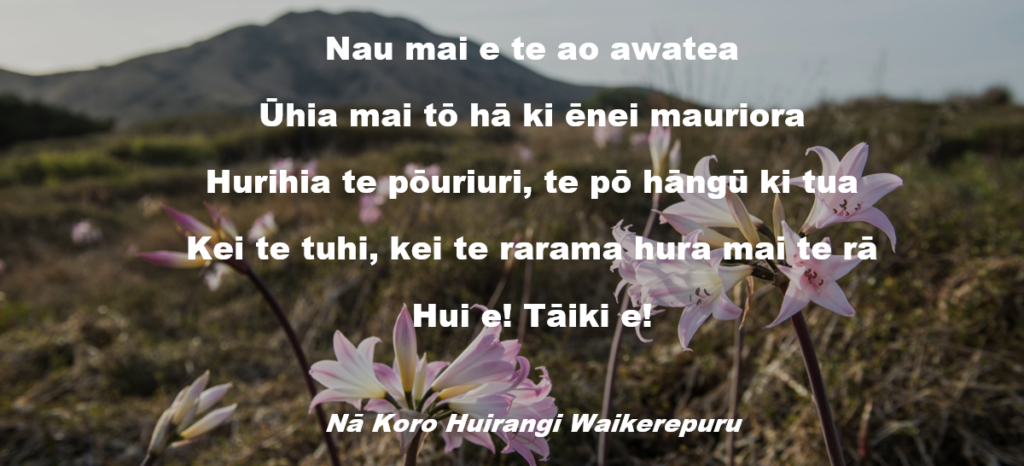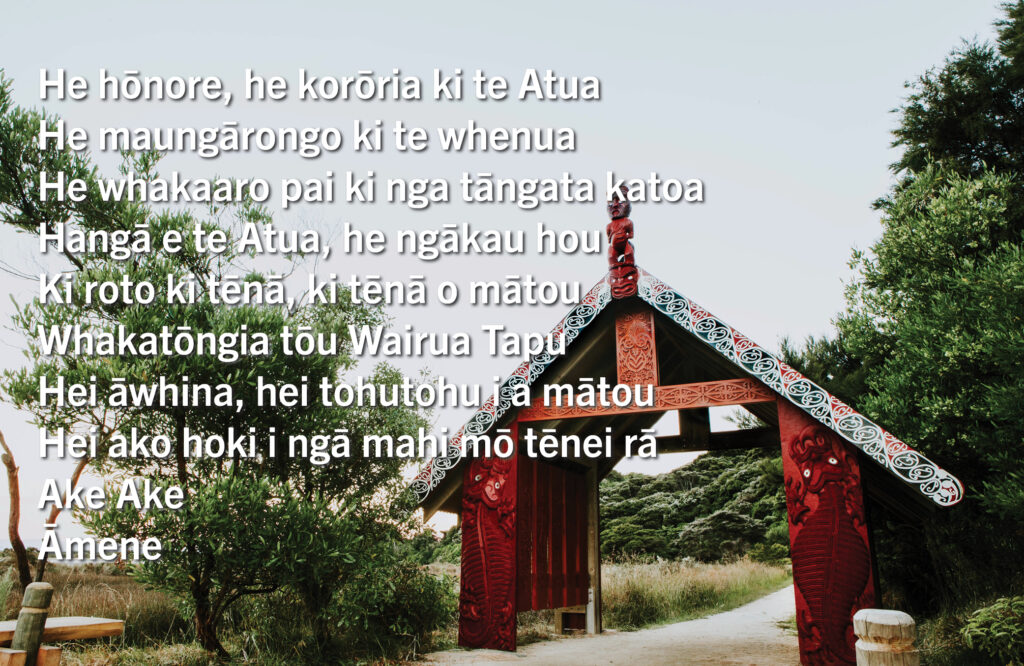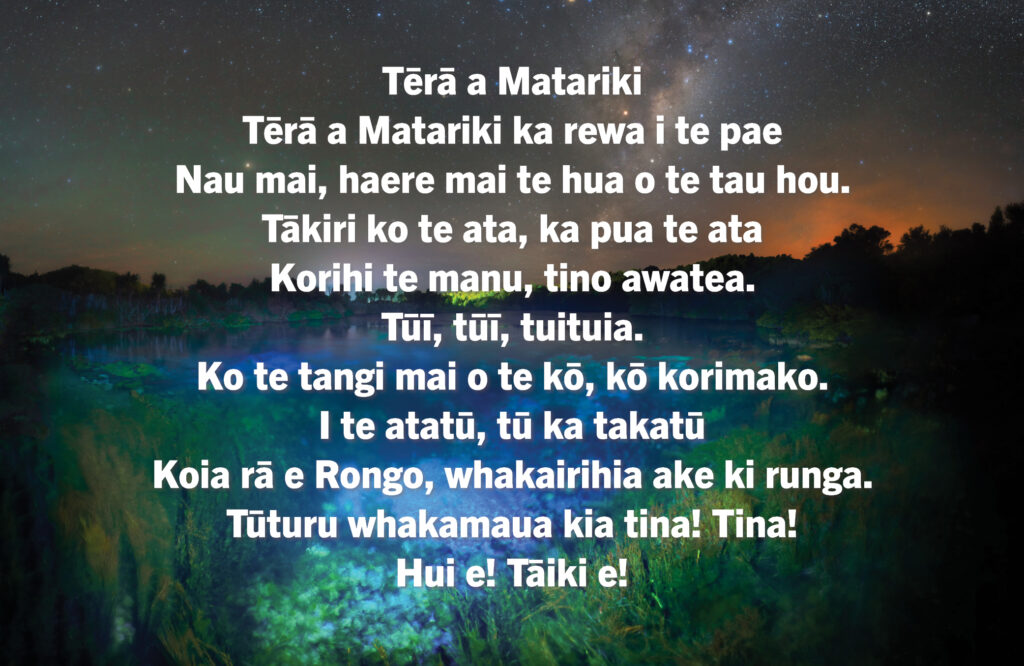VISION
BY 2050 TE REO MĀORI WILL BE ONE OF THE MAIN LANGUAGES IN 50% OF ALL NGĀTI TAMA KI TE TAUIHU HOMES
He Whakarāpopoto | Executive Summary
Te Waikoropupū wells up from under the ground. The waters that gurgle up are some of the purest and clearest waters in the world, filtered through caverns of sandstone buried deep in the land. Impressively Te Waikoropupū is the largest coldwater spring in the Southern Hemisphere and releases tens of thousands of litres of water a second, feeding the river systems around it. But more importantly, Te Waikoropupū is a taonga, it is a wāhi tapu, home of Huriawa and has been feeding Ngāti Tama spiritually and culturally for generations.
We want our language to be like Te Waikoropupū. We want it to be natural and grounded in our heritage, whakapapa and tikanga. We want it to be clear, to be heard. We want it to infiltrate our homes and communities. We want it to nurture the cultural identity and confidence of all of our whānau. It is a taonga that we hope generations of Ngāti Tama will draw strength from.
Te Reo me ōna Tikanga
A collection of Ngāti Tama ki Te Tauihu waiata, karakia, tikanga protocols on the marae and Te Reo resources for whānau of Ngāti Tama ki Te Tauihu.
Tikanga o Te Marae
Much of the tikanga practiced on marae today has remained unchanged over the years. The protocols witnessed on marae throughout Taranaki today have largely been influenced by the Parihaka prophets, Te Whiti o Rongomai and Tohu Kākahi. The main premise being that the marae proper is the domain of Tūmatauenga – the deity of conflict and aggression whereas the pouwhare is the domain of Rongo – the deity of peace and goodwill to all people. Therefore, it was prudent that all Taranaki iwi adhere to this tikanga, given the passive resistance kaupapa of Parihaka.
Formalities like pōwhiri and tangihanga services are generally conducted inside the pouwhare except where the occasion may be dictated by the numbers attending or the weather allows for some flexibility.
The pōwhiri has sometimes been likened to the famous ballet, the ‘Dance of the Seven Veils’ whereupon the dancer discards a veil at certain points of her performance. The same can be said of the pōwhiri whereby at least seven stages need to be attained to be regarded as noa. When the last stage has been achieved with the sharing of food, the manuhiri can be regarded as noa that is, attaining a state of neutrality and being free of tapu.
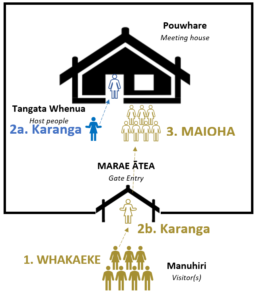
1. Whakaeke: meet at the entrance to ascend the marae In most situations, the pōwhiri will begin when the manuhiri have indicated that they are ready to ascend the marae.
2a. 2b. Karanga: a traditional call of welcome from the tangata whenua followed by the response from the manuhiri.
3. Maioha a brief silent pause in front of the pouwhare.
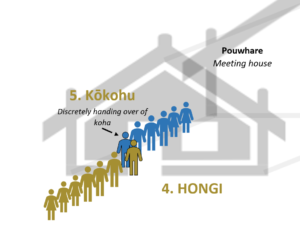
4. Hongi: formal greeting Manuhiri proceed directly into the pouwhare from the left-hand side led by the men and followed by the women and children where they will engage the tangata whenua with the hongi.
5. Kōkohu: handing over of koha This is the time when the koha is discretely handed over by the first male from the manuhiri to the first male of the tangata whenua. In Taranaki, the koha is not laid on the floor and may be regarded as impolite to do so.
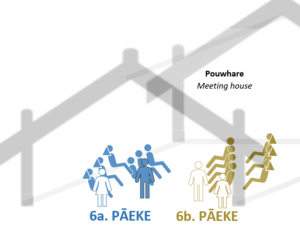
6. Pāeke: welcome process From then on, the process is much the same as in other pōwhiri where pāeke is the tikanga, that is, the local speaker(s) (6a) will begin accompanied by a waiata followed by the visitors (6b).
Once the formal part (ōkawa) of the pōwhiri is completed, the visitors may be given the opportunity to speak in English (ōpaki) but it should never be assumed this will happen as it is a privilege and not a right determined by the hosts.
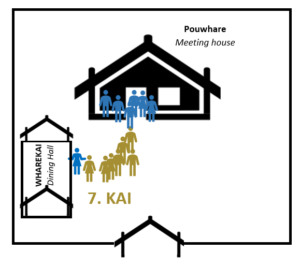
7. Kai: sharing of food At the completion of the formalities the visitors will be invited to lead both groups into the dining room (wharekai) to share kai which may be regarded as the last of the rites of the pōwhiri process to be completed and the final lifting of the tapu upon the visitors.
Download PDF of waiata and karakia
Waiata and Karakia Flip Cards from 2021 Wānanga
|
|
|
|
|
|
Download PDF of waiata and karakia
|
|
|
|
|
|
Tērā a Matariki
Yonder sits Matariki, suspended on the horizon.
|
|
|
|
|
|
|
|
|
|
|
|
|


